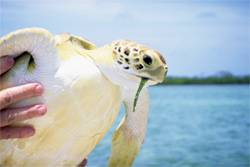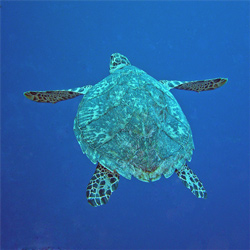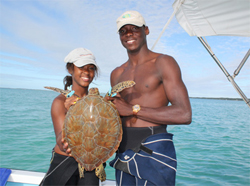We design our research studies to both answer questions of basic biology and address conservation needs. Our diverse research program has three primary focuses:
Long-term Research
Long-lived species require long-term research. Sea turtles are slow-growing and long-lived. Sexual maturity is attained only after decades and natural life expectancy approaches a century. As a result, studies on the biology and conservation of these species must also stretch over decades.
The vast majority of sea turtle studies has been conducted on nesting beaches where females come ashore to lay their eggs. This short but critical period is the time when sea turtles are most accessible to biologists. In addition to beach studies, we have focused our efforts on in-water studies, where turtles spend about 98% of their lives.

Healthy Marine Ecosystems
Conservation of sea turtles promotes healthy marine ecosystems. Recent collapses of coastal marine ecosystems are largely a result of over-exploitation by humans of large carnivores and herbivores – including sea turtles – beginning hundreds or thousands of years ago. Sea turtles and other megafauna maintain diversity and stability in marine ecosystems.
In the Atlantic, sea turtles have been reduced to about 10% of their former abundance. Only by defining the ecological roles that sea turtles once played in marine ecosystems can we hope to restore these ecosystems to healthy and productive systems, not only for the benefit of wildlife but also for the benefit of humans.

Protecting Florida’s Natural Heritage
Florida beaches host the largest population of nesting loggerheads in the world. Of the seven species of sea turtles in the world, five species nest on Florida beaches and forage in Florida waters. Florida, therefore, has both the privilege and the duty to be responsible stewards for these endangered species.

Photo: Stephen Connett